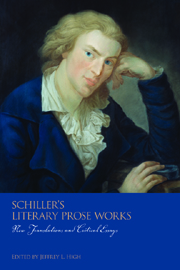Book contents
- Frontmatter
- Contents
- Foreword
- Preface
- Acknowledgments
- Notes on the Translations
- Introduction: Schiller and the German Novella
- The Translations
- The Critical Essays
- 9 (A fragment of) A True Story (from most recent history): The Truth in Schiller's Literary Prose Works
- 10 Playing with the Rules: Schiller's Experiments in Short Prose Fiction, 1782–1789
- 11 Diderot and Schiller's “Revenge”: From Parisian Parody to German Moral Education
- 12 True Crime and Criminal Truth: Schiller's “The Criminal of Lost Honor”
- 13 Der Geisterseher: A Princely Experiment or, the Creation of a “Spiritualist”
- Chronological List of Schiller's Literary Prose Works in English Translation
- Works Cited
- Notes on the Contributors
- Index
11 - Diderot and Schiller's “Revenge”: From Parisian Parody to German Moral Education
from The Critical Essays
Published online by Cambridge University Press: 05 February 2013
- Frontmatter
- Contents
- Foreword
- Preface
- Acknowledgments
- Notes on the Translations
- Introduction: Schiller and the German Novella
- The Translations
- The Critical Essays
- 9 (A fragment of) A True Story (from most recent history): The Truth in Schiller's Literary Prose Works
- 10 Playing with the Rules: Schiller's Experiments in Short Prose Fiction, 1782–1789
- 11 Diderot and Schiller's “Revenge”: From Parisian Parody to German Moral Education
- 12 True Crime and Criminal Truth: Schiller's “The Criminal of Lost Honor”
- 13 Der Geisterseher: A Princely Experiment or, the Creation of a “Spiritualist”
- Chronological List of Schiller's Literary Prose Works in English Translation
- Works Cited
- Notes on the Contributors
- Index
Summary
AT THE CONCLUSION OF HIS SHORT STORY, “Ein merkwürdiges Beispiel einer weiblichen Rache” (A Remarkable Example of Female Revenge), Schiller adds a postscript in which he identifies his source. An unpublished manuscript by Diderot was making the rounds, he tells us, a novel, which Schiller calls, “Jakob und sein Herr oder Fatalismus” (Jacob and His Master or Fatalism). The theater director in Mannheim, Heribert von Dalberg, owned a copy, which he gave to Schiller. The “bold novelty of the intrigue,” the “unmistakable truth of the narrative,” and the “unadorned elegance of the description” persuaded him to attempt what he labels “a translation” for publication in his literary magazine, Die Rheinische Thalia in 1785 (see p. 37). But is what he produced a translation? A closer look will reveal that Schiller's work is best described as an adaptation of a segment of Diderot's novel. Contrary to what Schiller suggests in his postscript, he didn't merely translate, but rather restructured the story in such a way as to tell a different tale. As we shall see, Diderot's rendition is a piece of juicy gossip told by an innkeeper's wife about one of her aristocratic patrons. Schiller's version, by contrast, is meant as an example of unbridled vengeance, the ultimate intrigue against an unsuspecting ex-lover, in short: the work of a monster.
- Type
- Chapter
- Information
- Schiller's Literary Prose WorksNew Translations and Critical Essays, pp. 202 - 221Publisher: Boydell & BrewerPrint publication year: 2008



